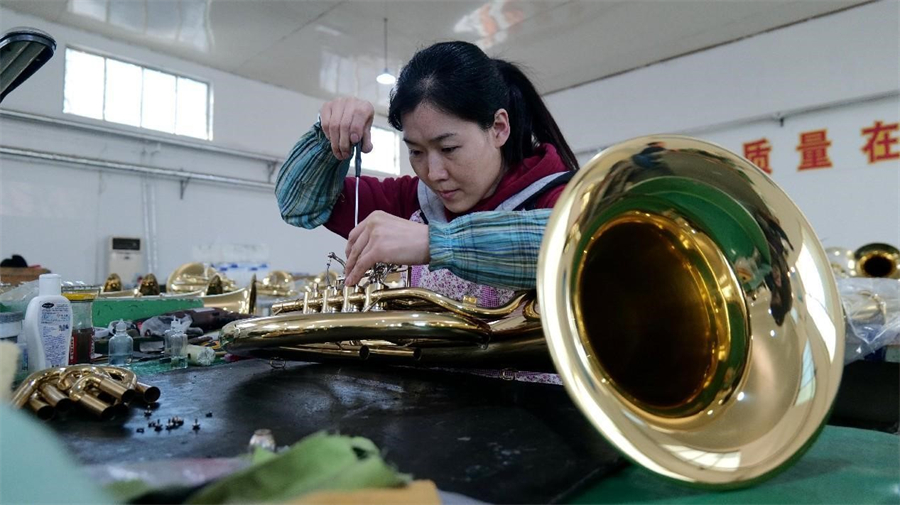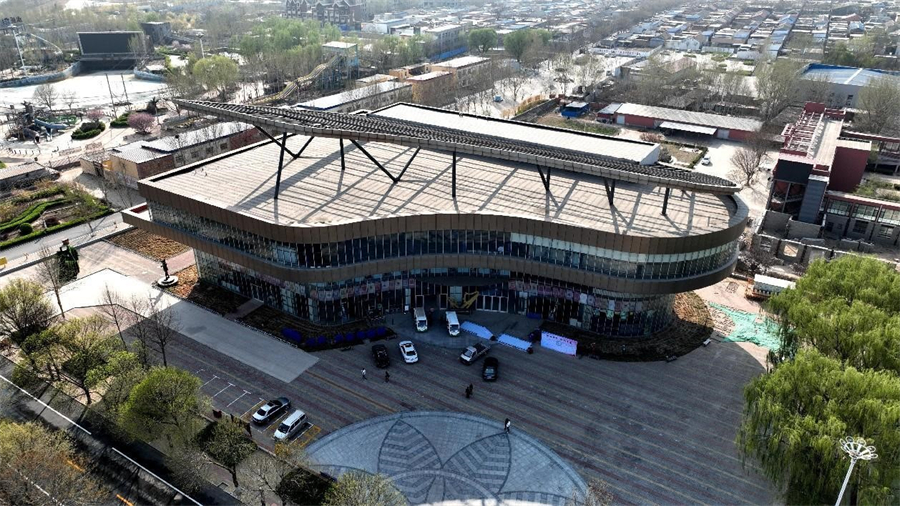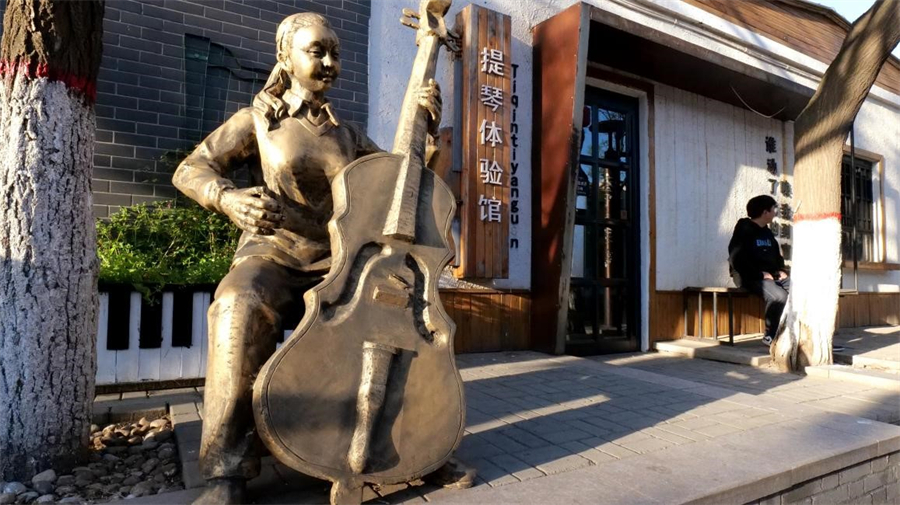Village in north China's Hebei prospers as land of music
As the sun rose, the Zhouwo Music Town came into view in Zhouwo village, which is less than 10 kilometers away from the county seat of Wuqiang county, Hengshui city, north China's Hebei province.
Taking a walk in the village, one can hear piano music played on a loudspeaker, see streets painted with pictures of guitars and pianos, signboards in the shape of cassettes and drum-shaped dustbins, and find a musical instrument museum which preserves 1,500 musical instruments. In Zhouwo village, elements of music can be found everywhere.

A worker assembles a saxophone at a factory of the Jinyin Group in Wuqiang county, Hengshui city, north China's Hebei province. [Photo/Su Xiaoli]
"Our small village has become a town of music filled with artistic atmosphere," said Zhou Zhixue, head of the villagers' committee of Zhouwo. Zhou said that one third of the village's residents work in musical instrument factories.
How has the small village been able to build a music town?
In the 1980s, there was a surging demand for Western musical instruments in China. Chen Xuekong, a villager in Zhouwo, spotted business opportunities in the market. With musical instrument manufacturing techniques he had learnt in another place, Chen went back to Wuqiang and opened the county's first musical instrument factory in cooperation with the villagers.
By learning techniques from technicians of musical instrument factories in big cities, the local villagers had continuously improved the quality of products they made.
The musical instrument factory later developed into the Jinyin Group, becoming a manufacturer of medium- and high-end products and gradually entering the global market.
The Jinyin Group produces more than 100 types of musical instruments, including woodwind instruments, brass instruments, the violin family and the guitar family.
The company's annual output of Western wind instruments has hit one million, achieving an annual output value of 426 million yuan (about $59.25 million).
The musical instrument industry has created employment for local villagers and increased their incomes. However, the "soft power" of the village remained the same.
Therefore, the local government decided to expand the industrial chain and incorporate music into people's lives by building a music town that would produce musical instruments and provide travel experience for tourists.

Photo shows a musical instrument museum located in the Zhouwo music town, Wuqiang county, Hengshui city, north China's Hebei province. [Photo/Zhao Hongchao]
The local government upgraded and renovated infrastructure and invited a culture and tourism company to make an overall renovation plan for the village.
While retaining the original appearance of residential houses in the village, the company renovated the residential dwellings and added an artistic touch to them. In 2012, the Zhouwo Music Town was preliminarily completed.
The music town has over 80 courtyards that are designed into B&B hotels, coffeehouses, and musical instrument experience stores. A music experience center and a musical instrument museum, which are newly built, are open to college students and teachers, industry insiders and film and television production companies from home and abroad.
In July 2022, the Zhouwo Music Town was rated as a national 4A scenic area in China.
In recent years, the music town has stepped up efforts to promote itself online and offline, having held many cultural exchange events, including the China Guitar Festival and open-air concerts, which saw the participation of many nationally and internationally renowned musicians, singers and bands.
In addition to watching performances, tourists can also go on a tour in the music town, see how musical instruments are made, and buy musical instruments.
At a musical instrument experience store, Han Qiang, a salesperson, showed a guitar to tourists and played it, winning their applause.
Before turning 40, Han was a farmer. "I planted crops on about 0.5 hectares of land and occasionally worked at construction sites," said Han.
Han cultivated an interest in the guitar when he was a construction worker working for the renovation project of Zhouwo village. He became a salesperson and a guitarist at a guitar store in the music town after he turned 40.

Photo shows a violin studio in the Zhouwo music town, Wuqiang county, Hengshui city, north China's Hebei province. [Photo/Su Xiaoli]
"Sometimes I can sell three to four guitars and violins a day and earn 70,000 yuan (about $9,736) a year," said Han.
Today, Zhouwo village has become a distinctive music town that integrates musical instrument production, sightseeing, experience and teaching activities, art performances and catering and accommodation. The village's music, cultural and tourism industries see burgeoning growth.
The annual per capita income of residents in Zhouwo village has increased to 25,000 yuan today from more than 3,000 yuan before the music town was built. The music town has driven the development of six nearby villages.
Enterprises related to musical instrument manufacturing have also developed in Wuqiang, helping the county become an important exporter of musical instruments in China.
Currently, there are a total of 63 musical instrument manufacturing enterprises in Wuqiang and they have achieved collective and large-scale development. More than 10,000 people in the county are engaged in musical instrument manufacturing. In 2022, the operating revenue of the musical instrument industry in Wuqiang county exceeded 1.91 billion yuan.
The many musical events held in Wuqiang have enabled the seeds of music to start to take root in the hearts of local people. The music town has provided public welfare courses for local residents many times, inviting professional music teachers to teach the villagers to play musical instruments on a regular basis. The musical instruments were provided by local enterprises.
On a summer night, many bands consisting of local residents performed at a square in the village, winning rounds of cheers from the audiences. A band called "The Old Boy," comprised of Han and several other villagers, also joined the performance.
"I get different feelings when I listen to music and my life has been enriched by music," said Zhou Jinxiang, a saxophone enthusiast.
The local government in Wuqiang has launched a project of introducing musical instruments at middle schools, primary schools and kindergartens in the county. It has provided more than 1,200 musical instruments for local schools, trained more than 140 full-time and part-time music teachers, and carried out the pilot project in 15 schools. The project has seen the participation of more than 10,000 students.
























